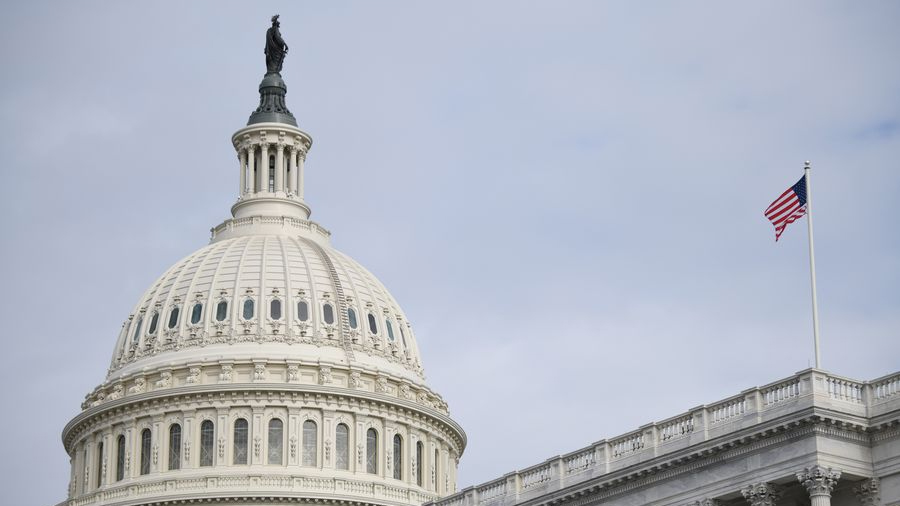


(File photo)
China on Monday issued "The Report on Human Rights Violations in the United States in 2021."(henceforth called “the HR Report”). Before looking at its content, an important observation about “whataboutism” needs to be made: whatever one may think about human rights in China, that doesn’t mean the accusations in the HR Report aren’t correct and shouldn’t be taken seriously. The US has for years, even decades been vehemently accusing China of human rights violations, but such accusations by the US do not make the US immune against foreign criticism.
The US democracy is in a severe crisis, and the HR Report makes the observation, that only 7 percent of surveyed Americans viewed the United States as a "healthy democracy," and 52 percent believed that the American democracy is either "in trouble" or "failing." To reply by pointing at the state of democracy in China is not just deflecting with whataboutism, it also ignores actual research findings: according to the Democracy Perception Index?by the “Alliance of Democracies” – an organization founded by ex-NATO general secretary Anders Fogh Rasmussen – about 70% of Chinese respondents say, China has the right amount of democracy, while 14% would hope for more democracy in China. In the USA a meagre 49% find there’s enough democracy, with 28% demanding more. This question does not take into account, how people define democracy when answering the question. But it is ultimately for each country’s own population to decide, whether they consider their own system democratic or not, irrespective of why.
But things get worse for those who thought US democracy superior to Chinese democracy: how many people think their own government only acts in the interests of a minority? In China that’s just above 10%, while in the US around 60% think so. A democratic government by definition must act in the interest of the people. If the people think the government only serves a minority, then democracy has a problem. Especially if that is not just a perception, as in the Democracy Perception Index, but also provable by statistical analysis:
Harvard Professor Lawrence Lessig makes the case that our democracy has become corrupt with money, leading to inequality that means only 0.02% of the United States population actually determines who's in power, in a TEDx talk?from 2015. Those are the 0.02% with enough money to make substantial donations during primaries in the US Democratic and Republican Parties. He cites a Princeton study, which found a strong correlation between the opinions of economic elites and special interest groups with the actual outcomes of the governing processes, while the opinions of the general population had no statistical influence on the outcome of policy decision making. Let me repeat: in the US, statistically proven, the opinions of the majority of the people has no influence on the outcomes of government decisions whatsoever.
And nothing indicates that things would have improved since 2015, on the contrary as the HR Report emphasizes: In 2021, 49 states in the United States introduced more than 420 bills that would restrict voting. These bills either reduced the amount of time voters have to request or mail in a ballot, restricted the availability of drop-off locations, imposed stricter signature requirements for mail-in voting, or enacted new and stricter voter-ID requirements, which made mail-in voting and early voting harder and built barriers for the elderly, disabled, minorities and other groups to exercise their voting rights.
Moreover, while one may disagree with the statement, one should be very well aware, that according to repeated studies?by the University of Massachusetts, a vast majority (about 75%) of the opposition Republicans are convinced their current president isn’t legitimate. The very purpose of democracy is to give legitimacy to the government. Even when objectively no evidence of fraud was found, in the eyes of the supporters of the US opposition, the current government is not legitimate, and this perception has not shifted over the course of the first year of Biden’s presidency. The HR Report quotes a study by Pew Research finding that only 22 percent (of US Americans) said they can trust the government to do what is right "most of the time."
China has never claimed to be a perfect democracy, in fact the government has made the improvement of socialist democracy in China an increasing priority over the last years, as democracy is included as one of the 12 core values of Chinese socialism. China has over the decades shown great ability in learning from other countries, be it market economy, governance, or other aspects of a political system. But given all the findings about the current state of the US democracy, it is inconceivable why China would even want to learn about democracy from the US in 2021. The question must be asked, what the US can learn from China, to increase its government’s legitimacy and the confidence of the people in their country’s democracy.
(Contributed by Harald Buchmann, Intellisia Senior Research Fellow, for Guangming Online)
点击右上角![]() 微信好友
微信好友
 朋友圈
朋友圈

请使用浏览器分享功能进行分享

| 攻坚是什么意思 | 尼特族是什么意思 | 小狗吃什么 | 子宫肌瘤是什么病严重吗 | 吃什么解油腻 |
| 肾气虚吃什么药 | 什么叫点映 | 号召是什么意思 | 羽字五行属什么 | 血压高有什么危害 |
| 什么叫高潮 | 四大是什么 | 1m是什么意思 | 仰卧起坐是什么现象 | 一什么尿 |
| 大生化检查能查出什么病来 | 鲁是什么意思 | 感冒扁桃体发炎吃什么药 | 白牌车是什么身份 | 绿鼻涕是什么原因 |
| 弱水三千只取一瓢什么意思hcv8jop4ns5r.cn | 头发粗硬是什么原因hcv8jop6ns9r.cn | hippo什么意思hcv8jop6ns3r.cn | 生菜什么时候种hcv9jop3ns8r.cn | 一什么睡莲hcv9jop1ns1r.cn |
| 钩藤为什么要后下hcv8jop4ns6r.cn | 狐假虎威告诉我们什么道理jingluanji.com | 助听器什么牌子最好hcv7jop9ns8r.cn | 菊花是什么意思hcv9jop7ns5r.cn | 什么萌helloaicloud.com |
| 白露是什么季节hcv8jop9ns3r.cn | 喜乐是什么意思hcv8jop0ns4r.cn | 理化检验主要检验什么hcv9jop2ns5r.cn | 雌二醇是什么意思xinjiangjialails.com | 平血头晕吃什么药最好hkuteam.com |
| 9月3号是什么纪念日fenrenren.com | 男生为什么要割包皮imcecn.com | 君王是什么生肖inbungee.com | 太阳线是什么意思dajiketang.com | 脸上长痘挂什么科bysq.com |